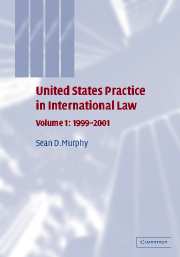Book contents
- Frontmatter
- Contents
- Foreword by Judge Thomas Buergenthal
- Acknowledgments
- Table of Periodical Abbreviations
- Table of Cases
- Table of U.S. Statutes
- Table of Treaties
- I General International and U.S. Foreign Relations Law
- II State Diplomatic and Consular Relations
- III State Jurisdiction and Immunities
- IV State Responsibility and Liability
- V International Organizations
- VI International Law and Nonstate Actors
- VII International Oceans, Environment, Health, and Aviation Law
- VIII International Economic Law
- IX International Human Rights
- X International Criminal Law
- XI Use of Force and Arms Control
- XII Settlement of Disputes
- XIII Private International Law
- Annex
- Index
II - State Diplomatic and Consular Relations
Published online by Cambridge University Press: 10 December 2009
- Frontmatter
- Contents
- Foreword by Judge Thomas Buergenthal
- Acknowledgments
- Table of Periodical Abbreviations
- Table of Cases
- Table of U.S. Statutes
- Table of Treaties
- I General International and U.S. Foreign Relations Law
- II State Diplomatic and Consular Relations
- III State Jurisdiction and Immunities
- IV State Responsibility and Liability
- V International Organizations
- VI International Law and Nonstate Actors
- VII International Oceans, Environment, Health, and Aviation Law
- VIII International Economic Law
- IX International Human Rights
- X International Criminal Law
- XI Use of Force and Arms Control
- XII Settlement of Disputes
- XIII Private International Law
- Annex
- Index
Summary
OVERVIEW
As of January 2001, the United States recognized 191 independent states worldwide and maintained diplomatic relations with all but four of those states (Cuba, Iran, Iraq, and North Korea). During the period 1999–2001, the issues of recognition that arose occurred in the context of changes in governments, such as the military coup in Pakistan, the rigging of an election in Peru, and creation of a coalition government in Austria containing radical right-wing elements. In each instance, the United States continued to recognize the government in control of the relevant state, but applied political and diplomatic pressure as a means of promoting respect for democracy and human rights. The United States used its economic power to isolate Federal Republic of Yugoslavia (FRY) leader Slobodan Milošević, then lifted economic sanctions against the FRY when he was deposed, and conditioned certain economic assistance on the transferral of Milošević to the International Criminal Tribunal for the former Yugoslavia in The Hague.
Separate from the issue of recognition, numerous incidents arose concerning the treatment of diplomatic and consular personnel and the provision to foreign nationals of their consular rights. The United States expelled as persona non grata Cuban and Russian diplomats on charges of spying, going so far as to strip one diplomat of his priviliges and immunities when he refused to depart from the United States. Certain efforts by foreign diplomats to sue the U.S. government in U.S. court for alleged torts in their treatment were largely unsuccessful.
- Type
- Chapter
- Information
- United States Practice in International Law , pp. 17 - 42Publisher: Cambridge University PressPrint publication year: 2003



